|
Genres, Themes, Actors, and Directors:
- Barbara Stanwyck Films
- Character Arc
- Dan Duryea Films
- Dana Andrews Films
- Gangsters
- Gary Cooper Films
- Howard Hawks Films
- Professors
- Richard Haydn Films
- Romantic Comedy
Review:
Peary doesn’t review Howard Hawks’ Ball of Fire (1941) — scripted by Charles Brackett and Billy Wilder, and loosely based on the tale of Snow White and the Seven Dwarfs — in his GFTFF, but he nominates it as one of the Best Movies of the Year in his Alternate Oscars (Citizen Kane wins), and names Cooper and Stanwyck as Best Actor and Actress of the Year. He points out that they each starred in three films that year: Cooper in Sergeant York (for which he won the actual Oscar), Stanwyck in The Lady Eve, and both in Meet John Doe — but he votes to award them for their work in this romantic screwball comedy about a “sassy, sexy nightclub entertainer, whose ambition is to marry… rich gangster Joe Lilac (Dana Andrews)” but who falls for Potsy (Cooper) because “he’s the kind of guy who gets drunk on a glass of buttermilk”. Despite — or perhaps because of — its zany premise, this film offers an unexpectedly wild cinematic ride, including a most-enjoyable musical interlude with Gene Krupa’s orchestra, a rafter of memorable supporting performances, and some truly zinger lines: “I shall regret the absence of your keen mind; unfortunately, it is inseparable from an extremely disturbing body.” Speaking of the script, my favorite throwaway line is by Aubrey Mather as Professor Peagram: “No, no, no, no… I insist that the happiest marriages are those which produce three children at intervals of not less than two or more than three years.” (!!!) (My three kids were born 20 months and 29 months apart — they almost qualify for these precise criteria, but not quite.)
In Alternate Oscars, Peary writes that Cooper’s Potsy is “extremely likable, genuinely funny, and much more aggressive and chatty than some of his most annoying innocents” — a point well-taken. He adds that Potsy “is Cooper’s sweetest character (even Mr. Deeds kept slugging people). Here’s a man who has had so few perks in his life that he gets excited just hearing Sugarpuss deliver slang” — and while he “thinks it’s only the phrases that thrill him… of course she has a lot to do with it.” Meanwhile, he writes that Stanwyck was “never sexier, more vivacious, or more energetic” than when she played Sugarpuss O’Shea, the “title character, who sets a fire in the boring, secluding lives of Potsy and his equally sweet collaborators and housemates” (who she describes as “eight squirrelly cherubs”). He points out that Stanwyck “zips around the frame with unbridled energy and quick, nonstop talk”, offering “opinions, information, slang, [and] wisecracks” while singing, dancing, and being extremely “fetching in both glittery bare-midriff costumes and casual dress”. Indeed, Cooper and Stamwyck make an ideal odd couple: it’s easy enough to invest in their happiness together despite her ongoing initial deception. By the climactic finale, we’re genuinely rooting for these two and their future.
Redeeming Qualities and Moments:
- Barbara Stanwyck as Sugarpuss O’Shea
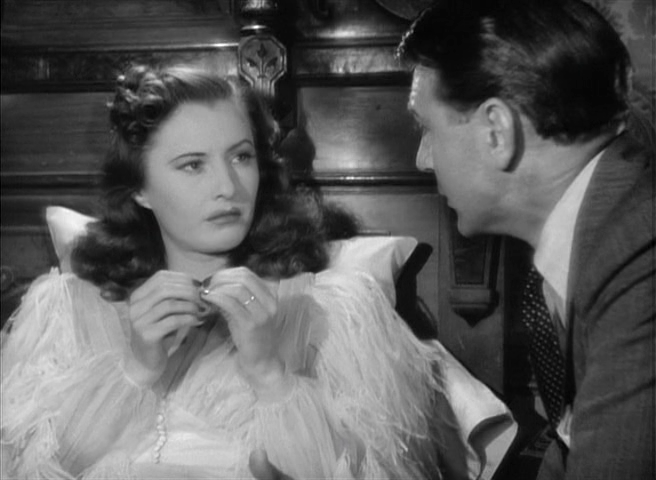
- Gary Cooper as Professor Potts
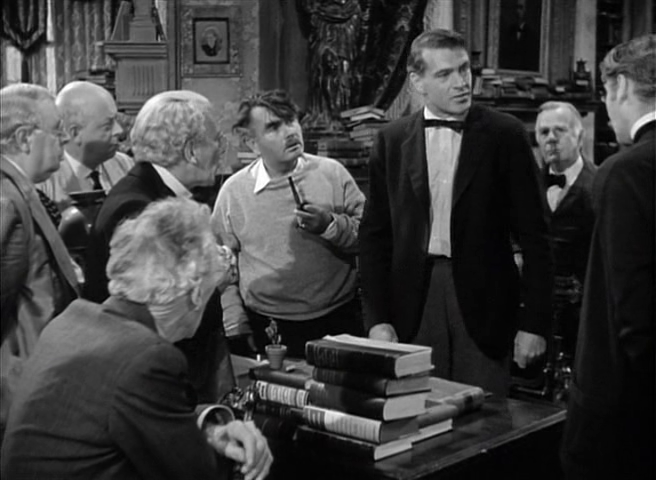
- Fine performances by the ensemble supporting cast — especially Mary Field as Miss Totten, Richard Haydn as Professor Oddly, and Dana Andrews as Joe Lilac
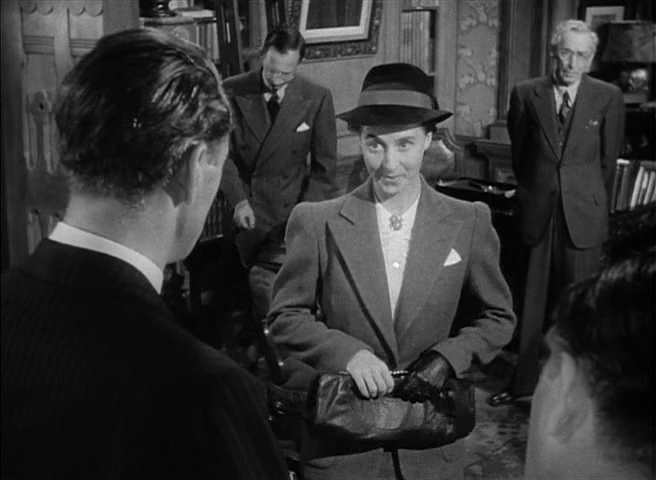
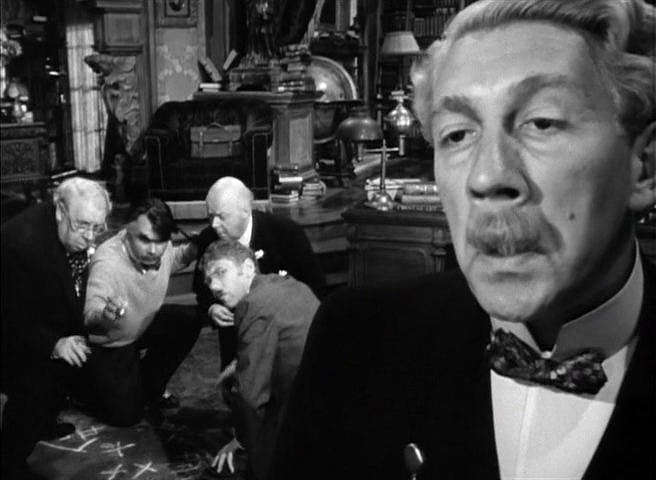
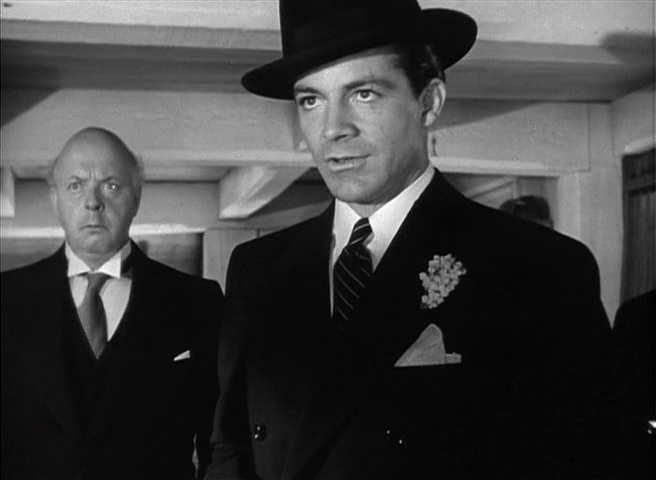
- The “Drum Boogie” music sequence with Gene Krupa and his orchestra
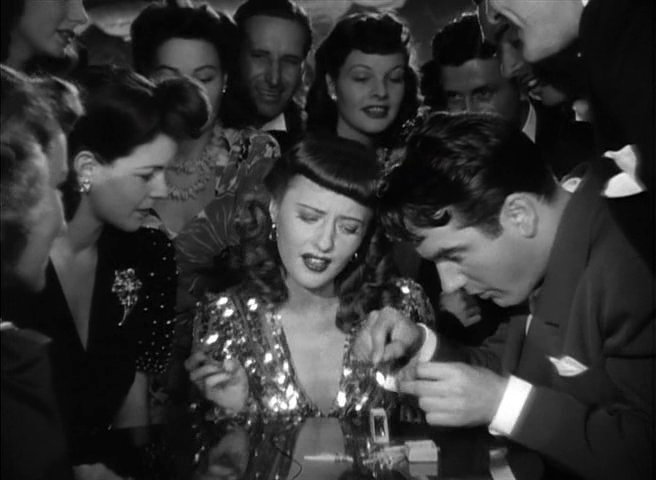
- Gregg Toland’s cinematography
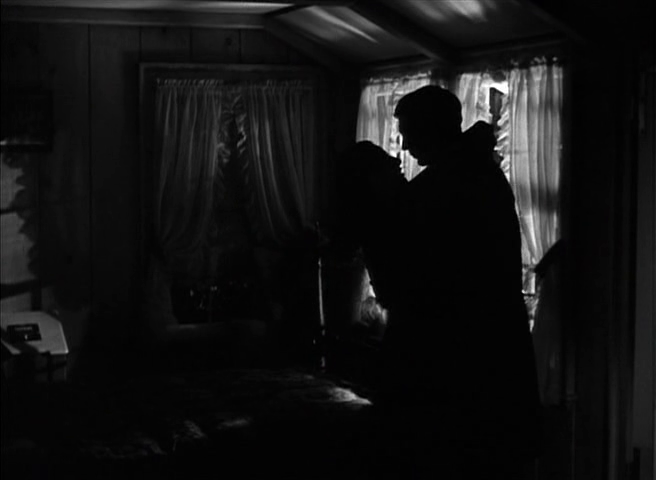
- Charles Brackett and Billy Wilder’s script: “Well, patchy my panty-waist!”
Must See?
Yes, as a most enjoyable romantic comedy. Nominated as one of the Best Movies of the Year in Peary’s Alternate Oscars. Selected for inclusion in the National Film Registry by the Library of Congress in 2016.
Categories
Links:
|
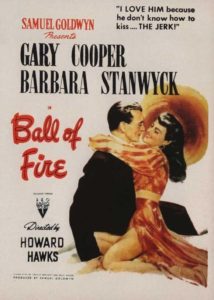







One thought on “Ball of Fire (1941)”
A once-must for Stanwyck and Cooper fans – who will, no doubt, find them both charming and entertaining.
But, personally, this film doesn’t do much for me. I’ve seen it twice and it didn’t seem to move me much. I find it a bit too quaint or precious in a number of ways and its humor a bit forced. (Some of it has now even dated – for example, Cooper’s preoccupation with slang of the period.)
As much as I like Stanwyck in general – I prefer Virginia Mayo (as being more suitable) in the remake ‘A Song is Born’, even though that film doesn’t do all that much for me either.